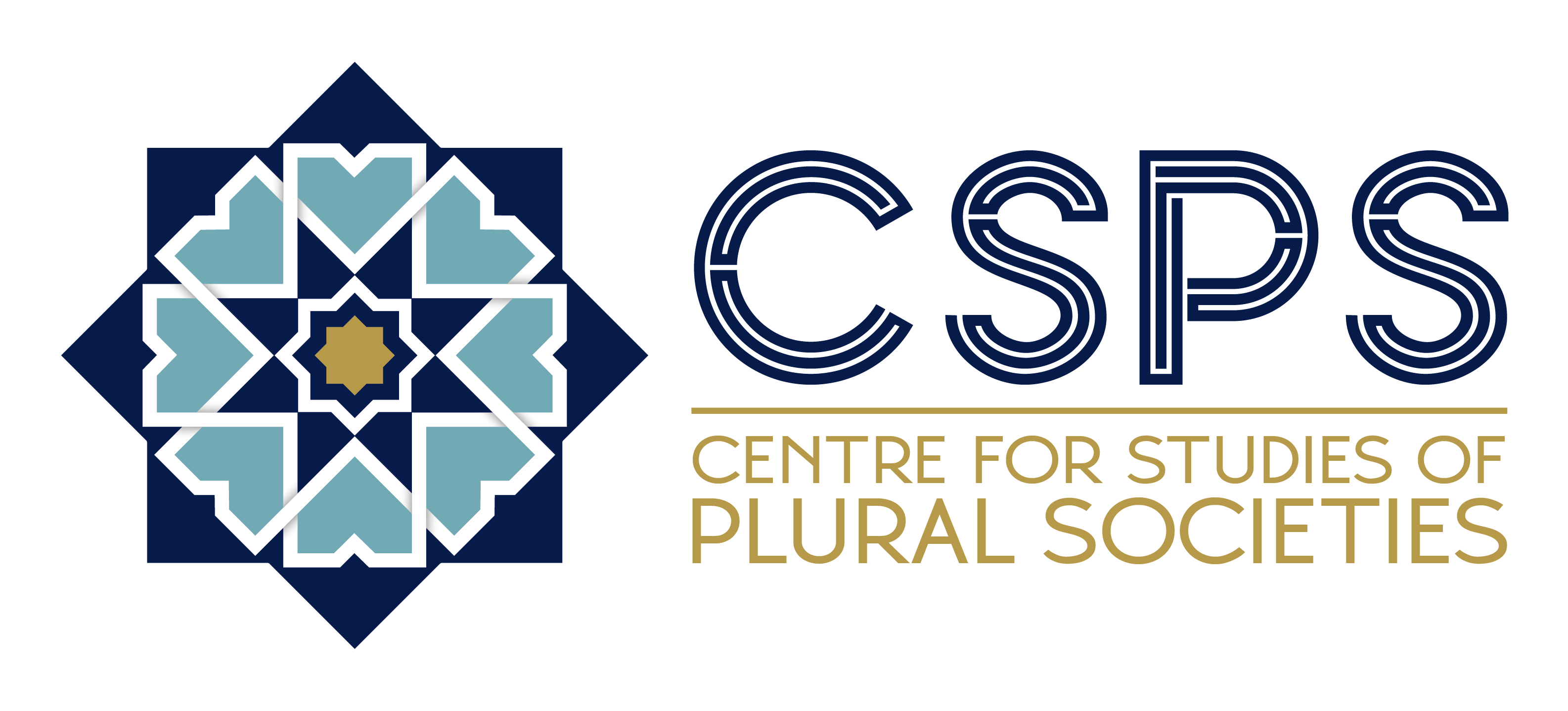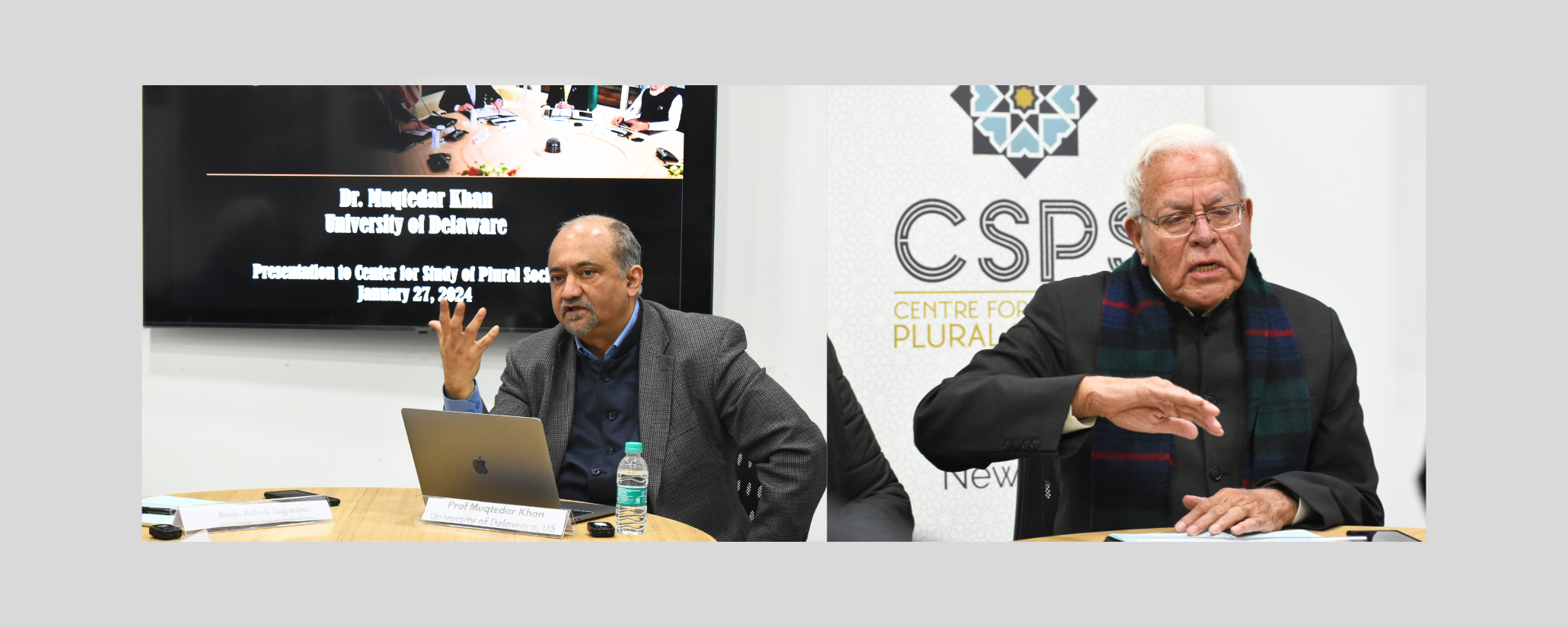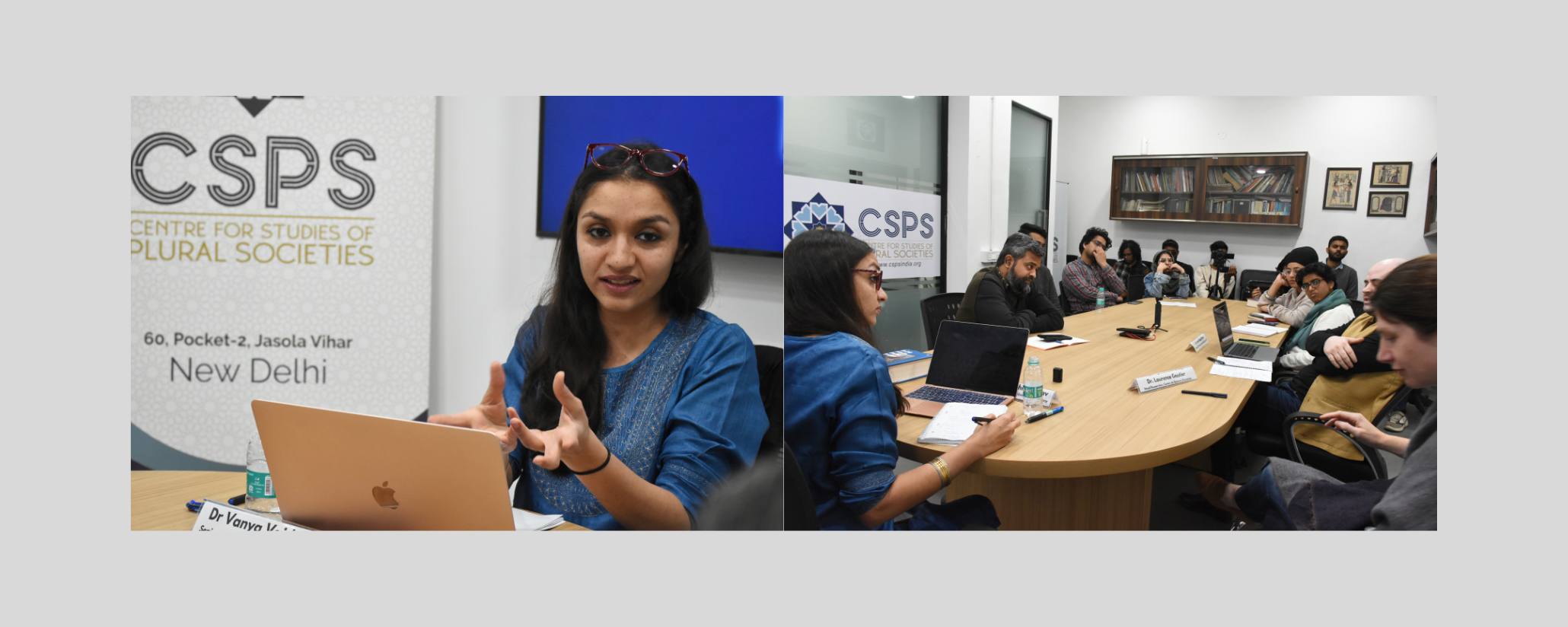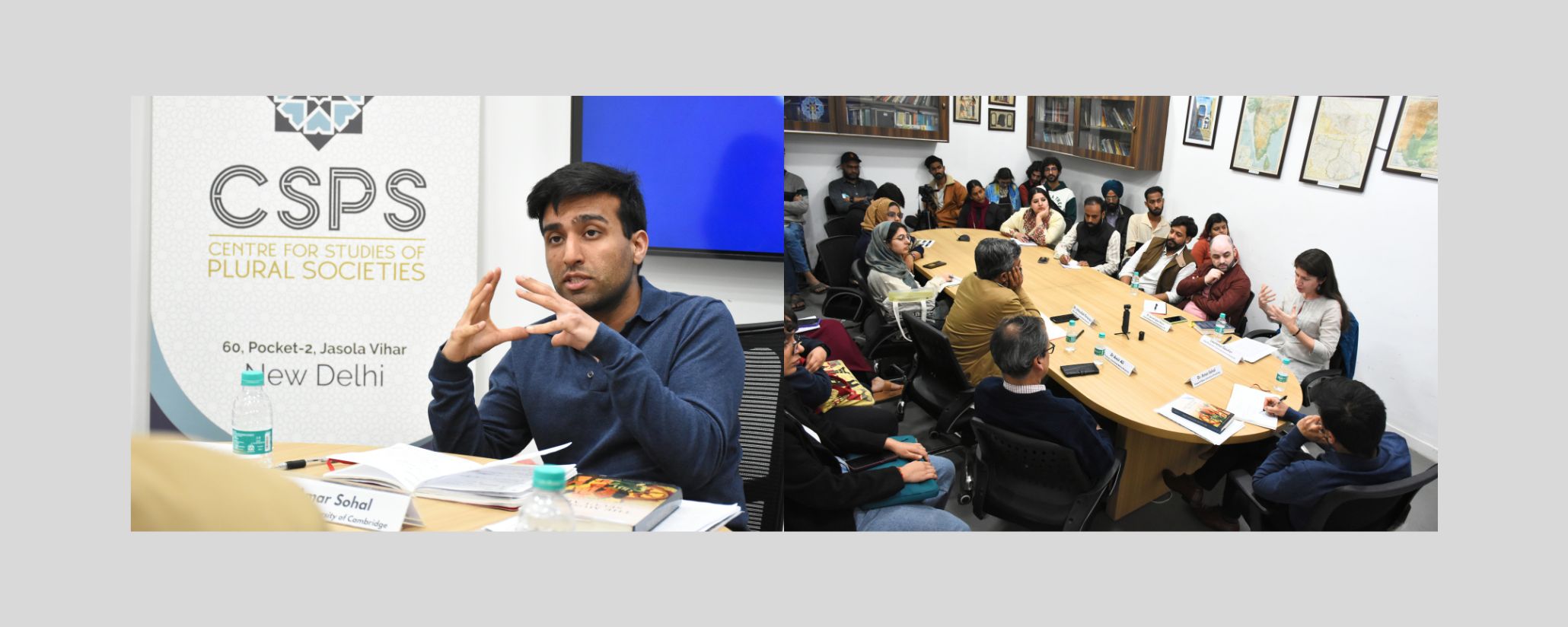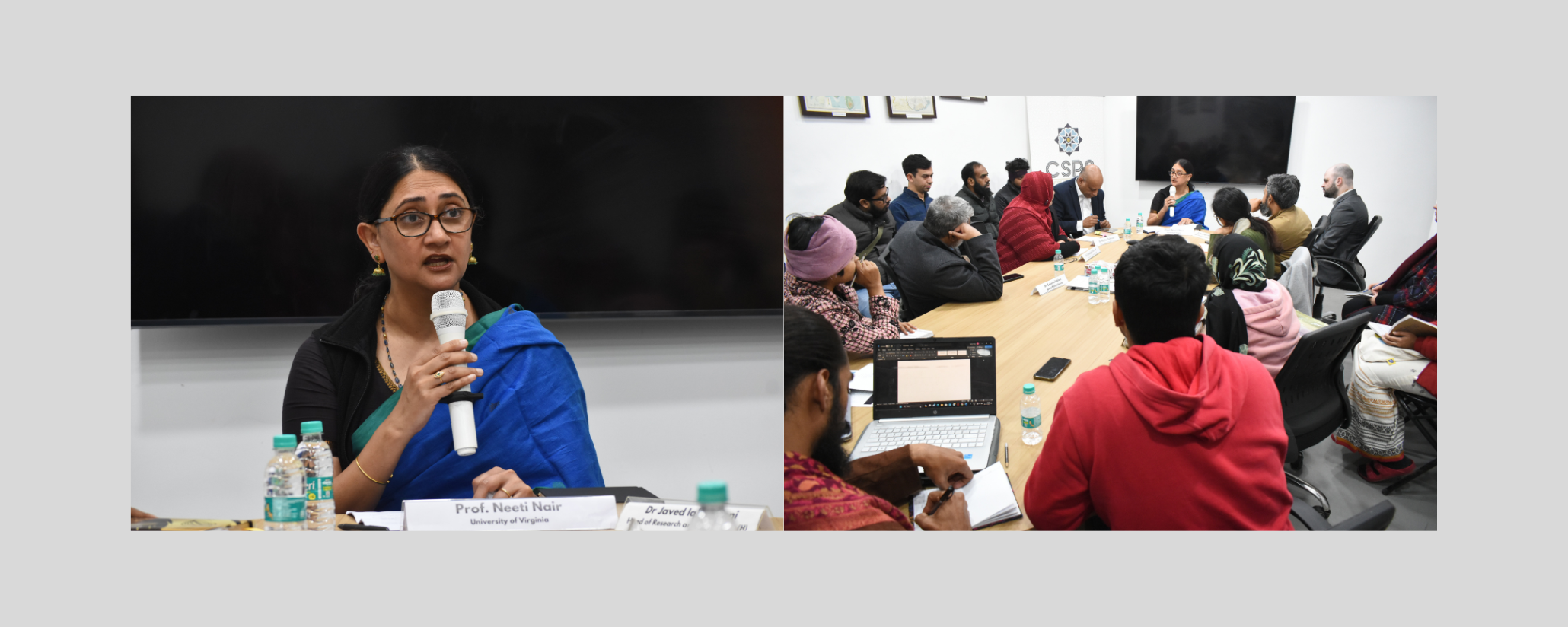The Centre for Studies of Plural Societies (CSPS) hosted a distinguished lecture featuring an expert discourse on the subject of “Indo-US Cooperation in Indo-Pacific: Challenges and Way Forward”. The lecture aimed to shed light on the challenges facing collaboration between India and the United States in the Indo-Pacific region. The esteemed speaker for this event was Prof. Muqtedar Khan, University of Delaware, Ambassador Ashok Sajjanhar, Former Ambassador of Kazakhstan, Sweden, And Latvia, and moderator Dr Sumaiyah Ahmed, Assistant Professor, Jamia Hamdard. Dr. Ahmed expressed her gratitude to them for accepting the invitation and briefed the guests and participants about the organisation, its goals, and objectives.
Prof. Muqtedar Khan provided a comprehensive overview of the Indo-US relationship in the context of the Indo-Pacific region. The speaker explored the historical background, current geopolitical dynamics, and the evolving nature of the strategic partnership between the two nations, especially for countering the dominance of China in the Indo-Pacific.
Prof. Muqtedar Khan and Ambassador Ashok Sajjanhar talk about how USA and India Relations were filled with tension and stress soon after India’s Independence. India’s policy of nonalignment especially during the Cold War has always been a point of concern for the West, especially the US. USA unipolarity after 1991 was also challenged by India through the policy of non-alignment. After the 9/11 attacks, the US asked India to dispatch troops to Afghanistan; the Indian military vetoed the request. When the US invaded Iraq in 2003, even then India’s erstwhile PM withheld military support. Even today, India refuses to toe the American line on the Russian-Ukraine war and its import of cheap Russian oil continues to break records. Pro-US voices have often been raised demanding India get “on the right side of history”. However, relations began to improve after US President Bill Clinton visited India in the year 2000. During the 1999 war between Pakistan and India, the U.S. under Clinton sided with India, the first time the country had supported India against Pakistan. In 1991, India initiated a policy of economic liberalization that opened doors to foreign investment. This was also a major boost to trade relations between the U.S. and India. The famous Nuclear Deal signed between PM Manmohan Singh and US President George W Bush represents positive camaraderie between India and the USA. During the visit of Obama in 2010, the USA backed India’s bid for a permanent seat in the United Nations Security Council. Donald Trump’s warm welcome in India through the “Namaste Trump” Event and Prime Minister Narendra Modi’s welcome through the ‘Howdy, Modi’ event in Houston, Texas, showcases that India and US Relations are at the Best of The Stage right now.
Prof. Muqtedar Khan says that the bilateral relations between India and the US are built upon various factors including the increasing market size of the Indian economy, the growing influence of the Indian diaspora in American business and politics as well as their consensus on the need of the hour to contain Chinese aggression, especially in Indo Pacific Region. As the US deepens its Indo-Pacific engagement and India solidifies its regional prowess, the partnership between these democratic powerhouses has the potential to reshape the geopolitical chessboard.
Prof. Muqtedar Khan talks about three forms of statecraft i.e. Tactics, Strategy, and Grand strategy. The tactic is about the use of weapons and troops to win battles. Strategy is about winning wars and Grand Strategy is much more than a strategy. It’s the highest form of statecraft. India and the USA do not only share a strategic partnership but also a “Grand Strategic Partnership” in the Indo-Pacific through 2+2 Ministerial Dialogues and the formation of QUAD.
Prof. Muqtedar Khan further elaborated on four different types of Grand Strategies that have been adopted by the USA with respect to its relationship with India. Those include Isolation, Offshore Balancing, Selective Engagement, and Global Domination.
Before the Cold War, the US followed the policy of Isolationism, which focused on domestic growth and avoiding foreign wars, relying on distance and neutrality. After the Cold War, the USA shaped the world order through alliances (NATO) and military presence, without occupying territory. This strategy of the USA was allied with Offshore Balancing. In Selective Engagement, the USA in the Post-Cold War prioritized core interests, intervening only in critical situations, to conserve resources. Through Global Domination, the USA maintained pre-eminence in all aspects, through military, economic, and ideological power, often involving unilateral action.
Prof. Muqtedar Khan and Ambassador Ashok Sajjanhar talk about how 2+2 dialogues, I2U2, and QUAD serve as a grand strategy to counter the growing dominance of China. The minister of external affairs and defence Minister of India and the secretary of state and secretary of defence of the United States on November 10, 2023, held extensive deliberations through 2+2 to further expand their global strategic partnership through greater defence industrial ties, enhancing engagement in the Indo-Pacific and boosting cooperation in key areas such as critical minerals and high-technology. On 12 March 2021, the PM of India Narendra Modi participated in the first Quad Leaders’ Summit virtually, hosted by President Biden. In the Joint Statement adopted at the Summit, the Leaders reiterated their common vision for a free, open, and inclusive Indo- Pacific region. The three practical areas identified for partnership at the Summit are affordable and equitable Covid 19 vaccine access for the Indo-Pacific; strengthening climate actions; and critical and emerging technology. Another grouping in the Middle East – I2U2 involving India, Israel, UAE, and the US is being termed the New Quad to counter China.
Prof. Muqtedar Khan and Ambassador Ashok Sajjanhar talk about possible improvements (way forward) that can be made in India-US Relations. The US-India partnership is not just beneficial, it’s crucial for securing a stable and just Indo-Pacific.
Both nations stand to gain immensely from India’s youthful population, with opportunities for collaboration in technology, manufacturing, and trade blossoming. As the international order reshapes itself, India, now rising to prominence, should capitalize on its current standing to pursue its key interests and contribute to a brighter global future. This dynamic partnership holds immense promise for shaping a prosperous and peaceful Indo-Pacific region.
During the engaging Q&A session that followed the lecture, the audience posed insightful questions, seeking clarification on specific points raised by the speaker. Both the speakers Prof. Muqtedar Khan and Ambassador Ashok Sajjanhar responded with depth and clarity, further enriching the discussion.
The report is prepared by Ishita Sagwan, a research intern at CSPS
